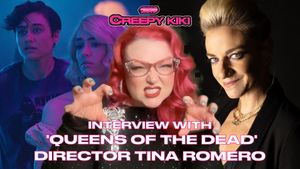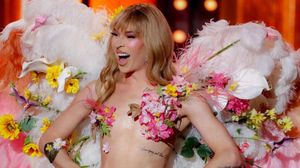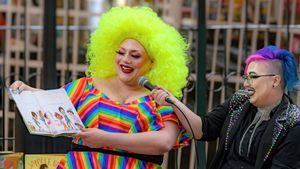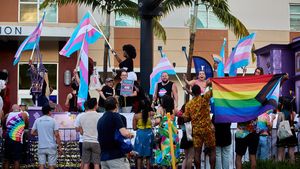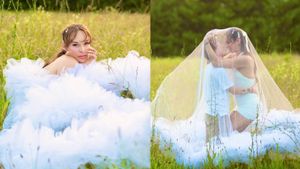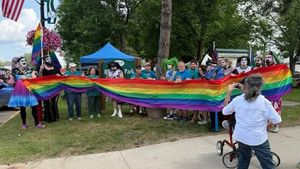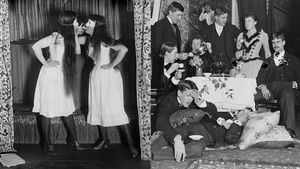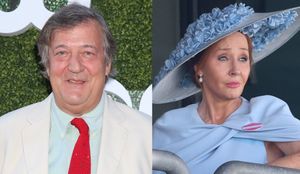All Rights reserved
By continuing to use our site, you agree to our Privacy Policy and Terms of Use.
If you've ever talked about drag, camp, butches, and/or trade, you know at least some words from Polari, a secret gay language adopted by gay men in the United Kingdom between the 1920s and the 1960s.
Polari was a gay slang language popularized in the U.K. while homosexuality was illegal, prompting gay men to find secret ways to communicate with one another without society understanding what they were talking about. According to Paul Baker of Lancaster University, there were approximately 500 terms and words in Polari, but most people who spoke the language weren't familiar with all of them.
Over the years, Baker has explained that the language came from a variety of sources, including rhyming slang, backslang (or pronouncing a word spelled backwards), as well as "Italian, Occitan, French, Lingua Franca, American air force slang, drug-user slang, Parlyaree (an older slang used by tinkers, beggars, and traveling players) and Cant (an even older form of slang used by criminals)."
7 words that come from Polari and we still use as gay slang.
Similar to the Hanky Code, Polari was used between gay men who wanted to identify one another while keeping anonymity in front of straight people.
The 1967 decriminalization of homosexuality in Great Britain made it less necessary for gay men to continue using this secret language. Moreover, Polari became more recognizable to mainstream audiences in the late 1960s, which made it less effective as a secret language.
Comedians Kenneth Williams and Hugh Paddick started playing campy gay characters named Julian and Sandy on the popular BBC radio show Round The Horne. One common phrase used by the pair in their appearances was "How bona to vada your eek!" which translates to "how good to see your pretty old face."
The language fell out of fashion pretty soon after it gained mainstream attention. However, there are still many words from Polari that the LGBTQ+ community uses to this day.
'Drag'
In Polari, "drag" meant "clothing (usually the sort you're not expected to wear)," according to Lancaster University. Now, the term is more often associated with performance artists who dress in ways that challenge, highlight, and/or comment on stereotypical gender norms.
'Naff'
"Naff," in Polari, meant "awful, tasteless." People still use "naff" today to mean something that is lacking in good taste.
'Trade'
In Polari, "trade" is used in reference to a "gay sex partner, often one who doesn't consider himself to be gay." Many in the gay community still use this term in basically the same way, specifically labeling masculine gay men who either identify as straight or who can "pass" as straight.
'Camp'
In Polari, "camp" relates to the "excessive or showy or affecting mannerisms of the opposite sex," according to World Wide Words. Now, the word has a similar but more complex meaning. In fact, "camp" has become so mainstream that the Met Gala featured it as its theme in 2019.
'Butch'
"Butch," a term to describe a masculine lesbian, also came from Polari.
'Zhuzh'
To "zhuzh something up" means to make it stylish, glamorous, and more attractive or exciting.
'Fruit'
"Fruit," when used as a term for a gay man, refers to an effeminate guy — and it also comes from Polari.
6 words from Polari that the queer community should bring back.
As queer culture becomes even more mainstream, even straight people have started identifying as twinks, or classifying themselves as tops or bottoms.
Unfortunately, different aspects of queerness are becoming criminalized again in both in the U.K. and the U.S. Recent laws passed in those countries have meant that trans people are no longer allowed to use public restrooms and locker rooms in certain places. In other cases, books with LGBTQ+ content are being banned. Others are banning drag. And just like that, the world is starting to look like the early 1960s once more.
Maybe the LGBTQ+ community should bring back this secret language. Even if they don't bring it back completely, here are a few terms from Polari that the queer community should start using again.
'Basket'
A "basket," in Polari, refers to a bulge showing through one's pants. Example: "Would you look at that basket?" said about a man in tight leather pants walking by a gay bar.
'Bevvy'
"Bevvy" means a drink. This is a cute and fun Polari word that's also easy to remember. It comes from a shortening of "beverage."
'Bona'
One of the most classic words from Polari, "bona" is an easy and entertaining term to bring back. It means "good."
'Vada'
Along with "bona," another classic word in Polari is "vada," which means to look. For instance, "Let me vada your face."
'Dish'
"Dish" meant "anus/bum," according to Baker. When someone says, "Look at that dish," it could mean "look at that good looking person." Moreover, it could also mean "look at that ass."
'Fantabulosa'
One of Paul Baker's books about Polari is titled Fantabulosa: A Dictionary of Polari and Gay Slang. This word, meaning "wonderful," is ripe for a comeback.
Latest Stories
The 'Last Call': Why losing our bars guts gayborhoods and mutes queer nights
'Ironheart': A guide to the MCU series starring Shea Couleé
JoJo Siwa says she felt 'forced' to come out as a lesbian
Inside the fury over Angelica Ross's throwback pic with Michael B. Jordan
David Archuleta hits gay puberty in his new music
Trend alert! Here are the menswear summer styles catching fire
Jak Malone blasts 'hapless politicians' demonizing LGBTQ+ people after Tony win
Keke Palmer's advice to queer people: 'Don't judge yourself'
Former Out editor: Rainbow capitalism is over
A guide to the 'Olympo' actors, characters, and gay storylines
Noah's Arc is back! Here's why its Black queer representation matters in 2025
Trending stories
Recommended Stories for You

Mey Rude
Mey Rude is a journalist and cultural critic who has been covering queer news for a decade. The transgender, Latina lesbian lives in Los Angeles with her fiancée.
Mey Rude is a journalist and cultural critic who has been covering queer news for a decade. The transgender, Latina lesbian lives in Los Angeles with her fiancée.



































